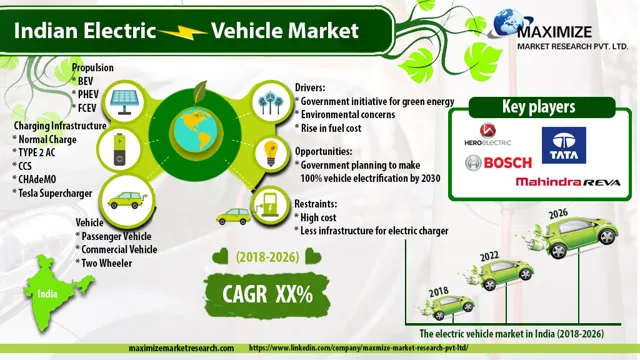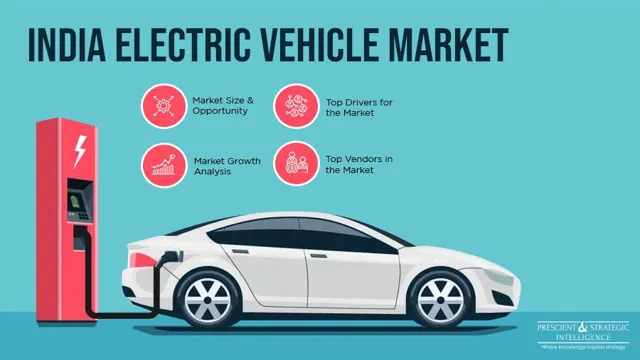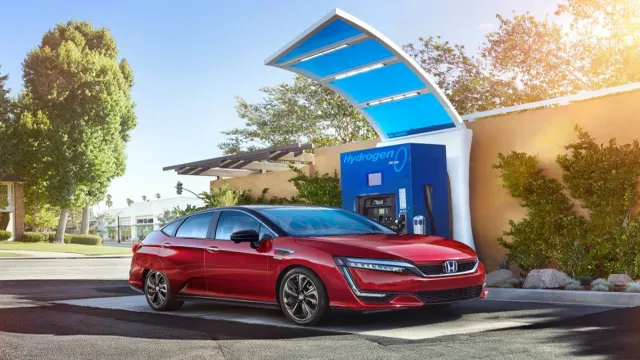Revving Up the Race: Top Indian Companies Poised to Benefit from the Electric Car Boom
Indian Companies & Electric Cars: A Promising Future As the world moves towards sustainable energy, the demand for electric cars is skyrocketing. India, being one of the fastest-growing economies globally, cannot afford to lag in this advancement. The government is already taking a significant role in accomplishing this by implementing its Electric Mobility Mission Plan 2020.
To further make progress, several Indian companies are stepping up to the plate. The idea of electric cars in India had seemed unrealistic for a while due to battery costs and the country’s dependency on imports. However, Indian companies are adopting battery technology and manufacturing, and some have even partnered with global organisations.
With these collaborations, they are now developing not only electric four-wheelers but even two-wheelers and buses that are environmentally friendly. One such company is Tata Motors, which is at the forefront of India’s indigenous electric car space. Tata Tigor and Nexon EVs were recently launched in India.
These vehicles have a range of around 300km per charge and can be charged in just under an hour. The cars also come with smart connectivity features and autonomous driving technology. Another promising Indian company in the electric car space is Mahindra Electric.
The company has already ventured into electric cars and now has a vast portfolio of electric vehicles in its lineup. Mahindra has also developed a shared mobility platform with electric cars called Glyd. Other Indian companies such as Ashok Leyland, Ola, and Bajaj are joining the e-mobility bandwagon.
These companies are either launching new electric models or participating in electric vehicle production with global partners. In conclusion, Indian companies are taking more prominent roles in developing an environmentally sustainable future. It not only addresses India’s need for a green future but also boosts the country’s economy and energy security.
EV Trends in India
India is gradually moving towards electric cars and it’s not a secret that it is going to benefit many companies. The automobile market is set to transform beyond recognition in India, and many businesses will reap the rewards of this transformation. Analysts predict that EVs’ acceptance in India will be the fastest in the two and three-wheeled vehicle market since their use is presently widespread and the cost-effectiveness factor is critical.
Indian companies including Bajaj Auto, Mahindra & Mahindra, Tata, and all-electric automaker Revolt Motors will benefit greatly from the EV push. However, they will face stiff competition from rising segment players who have entered the Indian market. With this in mind, these companies are already taking innovative steps to enhance their offerings to stay ahead.
Growing Electric Vehicle Market
India’s electric vehicle market is witnessing rapid growth and is expected to expand even more in the coming years. This growth is driven by the increasing demand for eco-friendly transportation options across the country. The Indian government’s initiatives to promote electric mobility, such as financial incentives, tax exemptions, and subsidies, have also helped boost the market.
One trend that is emerging in the EV industry in India is the rise of electric two-wheelers. With high fuel prices and traffic congestion, electric scooters and bikes are becoming popular among urban commuters. Additionally, the production of electric cars is also increasing, with major automakers introducing new models and entering the Indian market.
The adoption of charging infrastructure has been slow, but with the cooperation of private and public sectors, the infrastructure is expected to grow rapidly, further driving EV sales. Overall, the Indian EV market is predicted to grow at an unprecedented rate in the near future.

Government Push Towards EVs
As India seeks to reduce its carbon emissions and shift to more sustainable transportation, the government has been pushing for the adoption of electric vehicles (EVs). The country has set a goal of having 30% of all vehicles sold by 2030 be electric, and is offering numerous incentives to both manufacturers and consumers to make this a reality. These incentives include tax benefits, subsidies for the purchase of EVs, and the establishment of charging infrastructure across the country.
As a result, many carmakers have started to introduce new electric models into the Indian market, and consumers are increasingly considering EVs as a viable option for their transportation needs. Despite some challenges, such as the high cost of EVs and limited charging infrastructure in some areas, the trend towards electric mobility in India is set to become a major force in the future.
Benefiting Companies
When it comes to electric cars, there are a number of Indian companies that stand to benefit from the increasing demand for green transportation. One such company is Tata Motors, which has been leading the way in the development of electric vehicles in the country. Another key player is Mahindra & Mahindra, which has been investing heavily in the development of electric cars and has already launched a number of models in the market.
Other companies that are likely to benefit from the growth of electric vehicles include battery manufacturers like Exide Industries and Amara Raja Batteries, as well as charging infrastructure companies like ABB India and Delta Electronics. Given the many benefits of electric cars, it’s clear that these companies are well positioned to thrive in the coming years as more and more individuals and businesses make the switch to green transportation.
Tata Motors: EV Pioneer
Tata Motors has been at the forefront of India’s EV revolution, and it has reaped the benefits of its forward-thinking. The company has been able to expand its market presence and increase its profitability by capitalizing on the growing demand for green vehicles. However, the benefits are not limited to just Tata Motors itself.
The company’s efforts have had a ripple effect throughout the industry, as other automakers have followed suit and started producing their own EV models. This has boosted the country’s overall efforts towards cleaner air and a greener economy. Additionally, the widespread adoption of EVs has created new business opportunities for companies that are involved in manufacturing EV components, such as batteries, motors, and charging infrastructure.
All in all, Tata Motors’ pioneering efforts have not only benefited the company itself, but they have also had significant positive impacts on the economy and the environment as a whole.
Mahindra Electric: Leading EV Manufacturer
Mahindra Electric is at the forefront of electric vehicle (EV) manufacturing in India, and the benefits extend beyond just environmentally-conscious drivers. The company’s commitment to sustainability and innovation has made it a desirable partner for businesses looking to reduce their carbon footprint. Mahindra Electric offers a range of EVs, including passenger cars, buses, and even electric three-wheelers.
This versatility is ideal for companies looking to switch to EVs for their fleet, as they can choose the type of vehicle that best suits their needs. Additionally, Mahindra Electric offers solutions for charging and battery swapping, making the transition to EVs even more convenient. By partnering with Mahindra Electric, companies can not only reduce their environmental impact but also benefit from long-term cost savings and improved road safety.
Hero Electric: Top Two-Wheeler EV Manufacturer
Hero Electric is a leader in the electric scooter industry, providing eco-friendly and cost-effective transportation options to consumers. One of the biggest beneficiaries of Hero Electric’s success is the environment. As more and more people switch to emission-free transportation, the air quality in our cities will improve, reducing pollution and improving public health.
Additionally, companies that rely on delivery services, such as food and courier services, stand to benefit greatly from Hero Electric’s products. With increased efficiency and cost-savings, these companies can expand their operations and reduce their carbon footprint at the same time. Furthermore, the economic benefits of using Hero Electric’s products are immense.
Customers can save money on fuel costs and maintenance, and the industry as a whole will become more competitive, leading to more innovation and job creation. Overall, Hero Electric’s impact is far-reaching, and the benefits it provides are numerous.
Up-and-Coming Companies
As electric cars become more prevalent in India, there are a number of up-and-coming companies that are poised to benefit from this trend. One such company is Tata Power, which is already involved in the construction of charging stations for electric vehicles. With the number of electric cars expected to grow in the near future, Tata Power is well positioned to expand its charging infrastructure and take advantage of the increased demand.
Another company that is likely to benefit from the rise of electric vehicles is Exide Industries, which is known for its expertise in battery manufacturing. As electric cars require powerful and reliable batteries, Exide Industries is in a prime position to supply these components to manufacturers. Other companies that are worth watching include Mahindra & Mahindra, which has already introduced its own electric car to the market, and Hero Electric, which produces a range of electric two-wheelers.
Overall, as Indian consumers look for cleaner and more efficient forms of transportation, these companies are well positioned to meet their needs and play a leading role in the continued growth of the electric vehicle industry in India.
Ather Energy: Innovative EV Startup
Ather Energy is an innovative electric vehicle (EV) startup that is fast making a name for itself in the EV industry. Established in 2013, Ather Energy is focused on creating sustainable mobility solutions that cater to the specific needs of urban commuters. The startup has made significant strides in developing futuristic EVs that deliver a superior riding experience, and its flagship product, the Ather 450X, is a testimony to its breakthrough innovations.
With a focus on design, technology, and sustainability, Ather Energy is poised to revolutionize the EV landscape by making EVs accessible and affordable to the masses. The company’s vision of sustainability goes beyond just creating EVs; they are building an ecosystem that includes EV charging infrastructure, vehicle leasing and financing options, and innovative battery recycling programs. With a mission to make transportation cleaner, accessible, and sustainable, Ather Energy is one of the most promising up-and-coming companies in the EV industry today.
Revolt Motors: Disruptive EV Manufacturer
Revolt Motors is a relatively new Indian electric vehicle manufacturer that is disrupting the industry with its innovative and affordable offerings. The company was founded in 2019 and has since then gained a significant following among EV enthusiasts and consumers. Revolt’s flagship product, the RV400, is a high-performance electric motorcycle that has a range of up to 150 km on a single charge.
The RV400 also comes with features such as remote start and an AI-powered bike console, which make it stand out from other electric motorcycles in the market. In addition to the RV400, Revolt also offers the RV300, which is a more affordable alternative with a slightly shorter range. One of the most impressive aspects of Revolt’s business model is its battery-swapping network, which allows customers to exchange their depleted batteries for fully charged ones at designated swapping stations.
This eliminates range anxiety and makes electric motorcycles even more accessible to the masses. Overall, Revolt Motors is a company to watch out for in the EV industry, as it is focused on making electric mobility more convenient, affordable, and exciting for everyone.
Future Outlook
As we shift towards a more eco-friendly future, electric cars have gained popularity in India. And with this shift, certain Indian companies stand to benefit greatly. Tata Motors, for instance, has already made strides towards the electric car market with the launch of their EV model, the Tata Nexon.
They have also invested heavily in EV infrastructure, such as charging stations. Another Indian company set to benefit is Mahindra & Mahindra, who already have a range of electric cars on the market. With their experience in the EV industry, they are well positioned to capitalize on the upcoming surge in demand for electric vehicles.
Additionally, traditional automotive suppliers like Bharat Forge and Motherson Sumi could thrive as they adapt to the changing market, producing parts for electric cars and expanding into battery manufacturing. It’s an exciting time for the Indian automotive industry with plenty of potential for growth in the electric car sector.
Conclusion
As the world moves towards a greener future, electric cars are becoming increasingly popular. And with India being one of the world’s largest automobile markets, it’s no surprise that Indian companies are set to benefit from this trend. Companies such as Tata Motors, Mahindra Electric, and Hero Electric have already positioned themselves as key players in the electric car industry.
Their investment in research and development, as well as their focus on building charging infrastructure, will help them stay ahead of the game as the demand for electric cars continues to grow in India. So, if you’re looking to invest in the future of Indian automobiles, electric is indeed the way to go.
FAQs
How will the rise of electric cars in India impact the automobile industry?
The rise of electric cars in India is expected to benefit companies such as Tata Motors, Mahindra & Mahindra, and Ashok Leyland, which have already introduced electric models or announced plans to do so.
Which Indian company is leading the way in electric vehicle innovation?
Mahindra & Mahindra is often considered a leader in electric vehicle innovation in India, with a range of models already available and plans to introduce even more in the coming years.
Are any Indian companies partnering with foreign electric car manufacturers?
Yes, companies such as Tata Motors and Mahindra & Mahindra have formed partnerships with foreign electric car manufacturers, such as Jaguar Land Rover and Pininfarina respectively, to develop electric models for the Indian market.
How will the Indian government’s push for electric vehicles affect the market share of traditional automakers?
The Indian government’s push for electric vehicles is likely to impact the market share of traditional automakers, as companies that do not invest in electric models could be left behind. However, traditional car makers such as Maruti Suzuki and Hyundai are also developing their own electric models to remain competitive.

